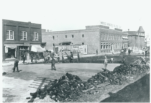For What It’s Worth: Kenney’s search for the middle ground
By CASH MOORE on November 18, 2021.
Since the onset of the pandemic, our premier hasn’t made many friends. Facing a leadership review in the spring and with an approval rating sitting at a measly 20%, Jason Kenney is by far the least popular premier in the country. The biggest gripe against Kenney has been his handling of Alberta’s COVID-19 response. Kenney’s approach to the pandemic has been a balancing act of trying to limit COVID hospitalizations in a way that minimizes infringement on civil liberties and damage to the economy. In this regard, Kenney’s approach has been somewhat successful. Up until the fall spike, Alberta has had lower rates of COVID-19 fatalities and hospitalizations compared to the rest of Canada, the United States and the European Union. Despite this, the political fallout from Kenney’s decisions has been overwhelmingly negative. The backlash is coming from both the left and the right. On one hand, there has been sharp criticism towards Kenney’s UCP for being too reluctant to impose harsher restrictions. These critics point to Kenney’s perceived inaction as the cause for unnecessary deaths and strain on the healthcare system. Furthermore, the UCP’s battles with nurses and doctors over wages hasn’t won him much support from this camp. On the other end of the spectrum, including a sizable chunk of his own party, there has been strong pushback against the health protocols and vaccine passport system that were put in place. From this point of view, the idea is that the social and economic costs of restrictions outweigh the benefits of reduced COVID transmission. In short, the reaction to Kenney’s COVID-19 response has largely been perceived as having been either too little or too much. One reason for this backlash may lie in Alberta’s political geography. Alberta is home to roughly 4.5 million people, with about half living in Calgary or Edmonton. Edmonton and Calgary are both large and progressive cities (by western Canadian standards). Residents of these cities have greater appetite for governments to play a larger role in society. Meanwhile, the other half of the province is made up of some of the most libertarian areas in the country, where ideas of personal responsibility and small government are dominant. Politically speaking, this puts our premier in a tough spot. Does he cater to his base in rural Alberta by letting COVID run its course and leave it up to individuals to determine their own risk assessment? Or does he take an authoritarian approach in an effort to appease the vote-rich cities? Aside from a brief reprieve from restrictions during the summer, Kenney has followed neither scenario, opting instead to take a middle of the road approach. Through this approach, he has pleased few and angered most. Jason Kenney left Ottawa with the goal to unite the fractured conservative movement in this province. Just two and a half years after the 2019 election, Kenney is faced with a splintered party. The Wildrose Party has been rejuvenated and the path is open once again for the NDP to form government. From a political standpoint, it’s clear that Kenney’s leadership has been a major failure. Kenney’s mistake by taking the middle ground during the pandemic was that he underestimated the sharp political divide between the rural and urban. In all likelihood he would be doomed regardless of what his approach was, but had he stuck to a lane rather than sitting on the fence, he may have stood a better chance. Cash Moore is a political science student at the University of Alberta from Medicine Hat. Feedback for his columns can be sent to letters@medicinehatnews.com 13-12
1 Comment
Oldest




